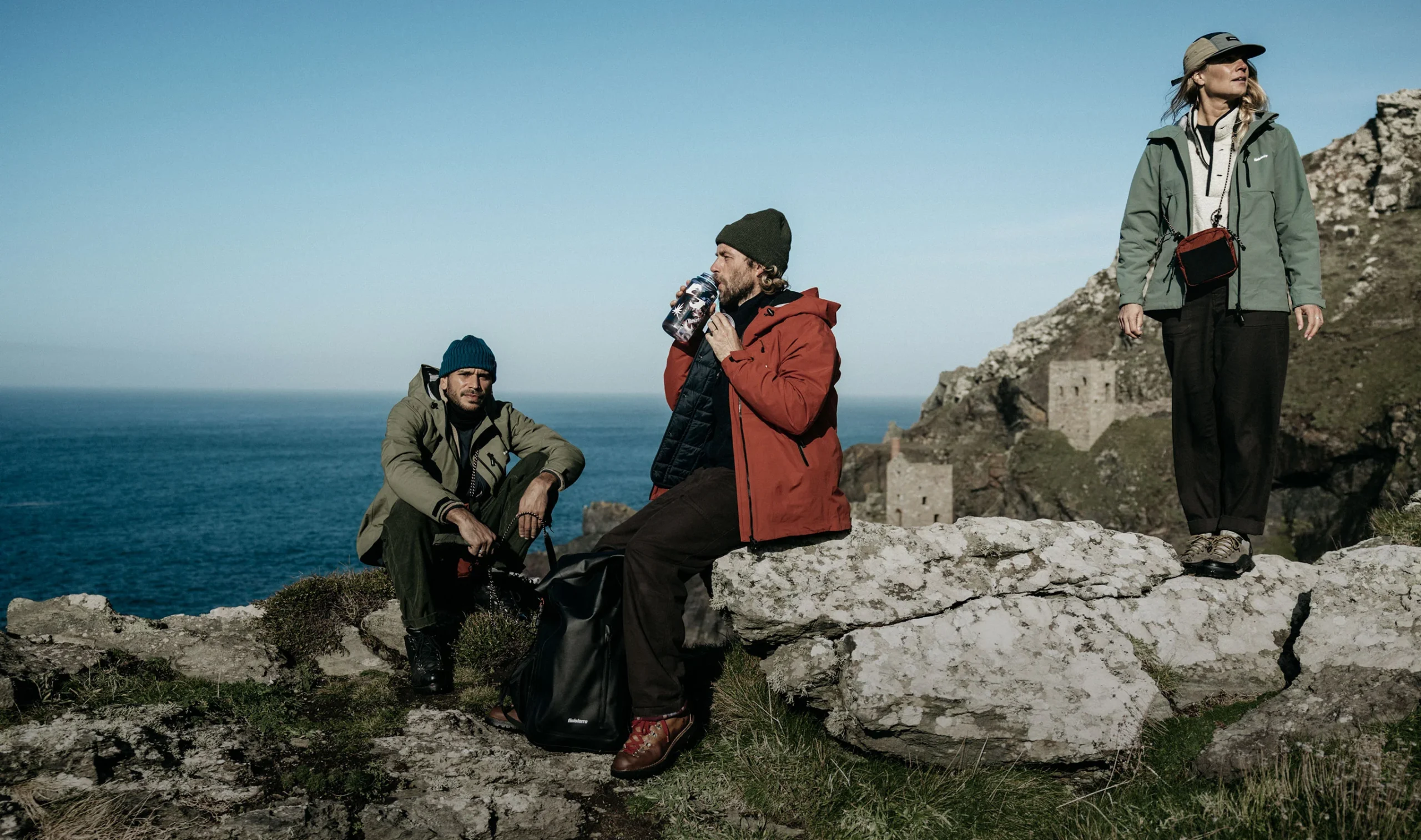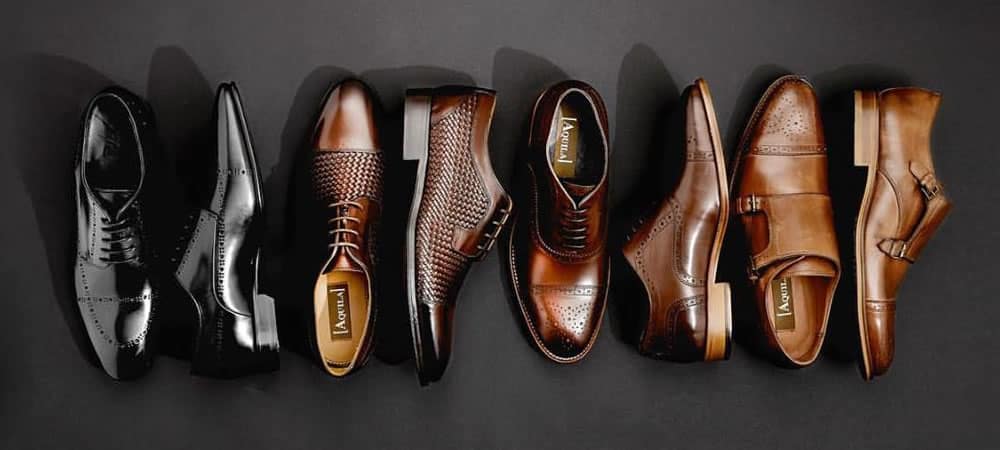6 of the best waterproof men’s jackets for spring showers from Finisterre
Feb 20, 2026La Bowtique made-to-measure: Review – Permanent Style
- Dec 30, 2024
- 0 Comments
860
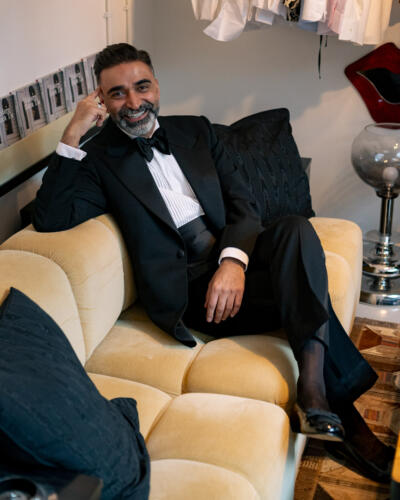
By Manish Puri.
The first dinner suit I ever purchased was from the online vintage shop Savvy Row: a nineties bespoke Anderson & Sheppard double-breasted. And, after some alterations – which, out of a sense of custodianship of the suit, I chose to have done at A&S – I turned to La Bowtique for a bow tie.
As Simon said in his introductory piece on the brand, “[the founder] Mickael…makes some of the finest bespoke bows”, and the one I purchased – a large drop in grosgrain – was the crowning glory of my eveningwear.
However, of more value to me was the opportunity to tap into Mickael’s knowledge of evening wear (he’s literally written the book on it) and his boundless enthusiasm for it.
As a consequence, I’ve felt emboldened to wear black tie at events that I’d never have previously considered: at the theatre, special dinners, and even a night out to mark a friend moving to New York. My dinner suit, instead of being a dusty trophy worn every couple of years, is now a fairly active part of my wardrobe.
Before bow ties became his full-time occupation, Mickael (above) spent a decade fitting customers for bespoke and made-to-measure at Cad & The Dandy and Huntsman. So when he launched his own MTM tailoring this autumn, I knew I’d want to try it if I could.
Although one can commission suits and separates, the core offering revolves around evening wear – a genre of clothing I think marries well with MTM. It’s not a stretch to assume assume readers would want to look as good as possible when attending a black tie do, so they might prefer something more customised than RTW; but, on the other hand, the cost-per-wear ratio of bespoke can be prohibitive.
Mickael offers the full spectrum of dinner jacket styles. However, it was the single-breasted peak lapel that caught my attention and ultimately my commission.
My jacket is typical of the house style in that it’s a classic cut – single-button closure, lightly padded shoulders, no vents, and longer and fuller than most modern jackets. The latter born out of pragmatism as much as any stylistic ideology, according to Mickael: “Black tie events are usually indoors, so you really don’t want anything to be too close fitting or you’ll overheat.”
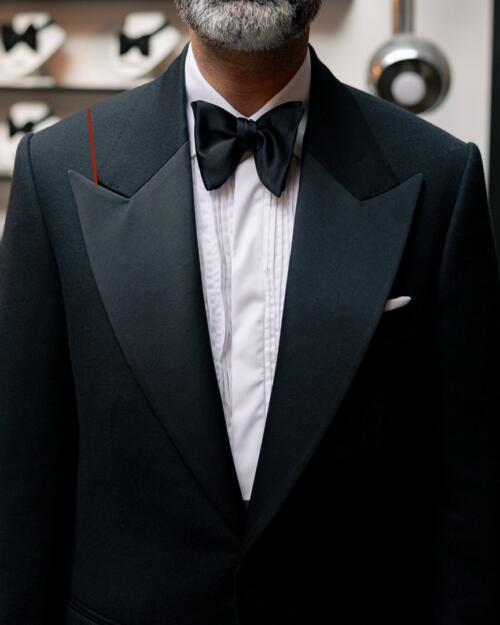
The defining feature of the jacket is the gorge line – which is low by contemporary standards. On my La Bowtique jacket, the distance between the shoulder seam and the point where the lapel meets the collar (marked in red) is 4.5 inches. The biggest gorge drop on my other tailored jackets is 4 inches, and most have a gap of just 3.5 inches.
While there are some benefits to a higher gorge (something we should talk about in a future article), it’s not something Mickael finds flattering in modern evening wear. Although, he acknowledges that the mainstream trend toward shorter jackets has meant the gorge has had no choice but to rise to maintain proportions.
Once again, there’s a practical element to his preference: a lower gorge permits the bow tie space to breathe. I mean, you don’t put angel wings close to the star on top of your Christmas tree, do you?
While it is possible to adjust the gorge height, I didn’t stray from the house standard. And while I might not go as low on every subsequent lounge or business suit, I love the visual impact on evening wear.
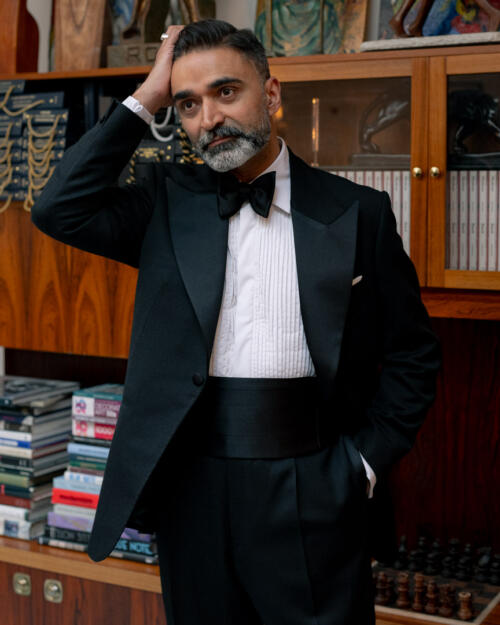
Perfecting the gorge and lapel is something I know Mickael has spent many months on – not just in design, but in his efforts to find a maker that could accommodate those designs. His initial plan was to use MTM factories, but found they usually operated within too strict parameters. “There wasn’t much room for any personal imprint,” he says.
Instead he partnered with a bespoke workshop in India to deliver garments made at a level typically reserved for bespoke: a hand-padded chest, collar and shoulder as well as hand-made buttonholes. The price is higher than if he’d pursued the factory route, but he and the customer have more flexibility as a result.
I did ask whether, given the nature of the make, he’d considered upgrading to a fully bespoke product. Mickael was emphatic that, even though in his tailoring career he’d done “everything but”, he wasn’t a cutter. He’s also someone who prefers to keep things simple.
“I don’t enjoy the back and forth that comes with bespoke, and there are so many variables that can go wrong,” he says. “I believe 80 to 90% of people can get a good result from MTM. Having fitting garments helps to visualise the outcome at the start of the process, which limits the risks massively. Of course, it’s important to explain to people what the limitations of MTM are to manage their expectations.”
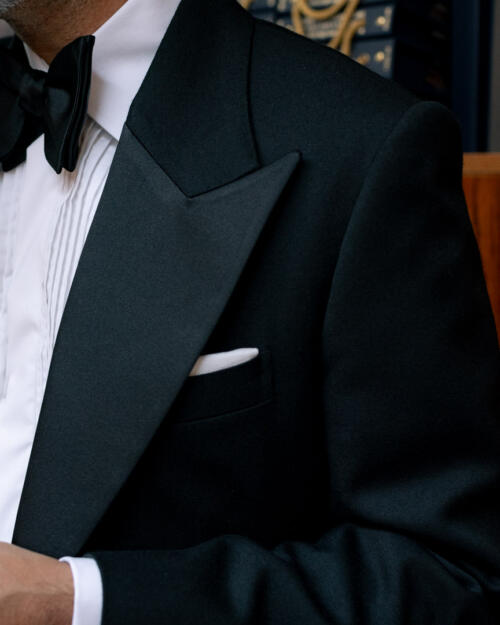
The fitting garments referred to are made from a kid mohair/wool blend. Mickael likes to use a lighter cloth here, as it’s easier to see where he needs to direct his attention when making adjustments.
But, equally important are the initial conversations around the customer’s existing wardrobe, their tastes and how they like to wear things. In Mickael’s opinion, because of the use of fitting garments, MTM’s main pitfall is less about style and more about miscommunication: mistakes occur because the maker hasn’t tried to, or hasn’t been able to understand what someone wants.
Knowing my more traditional persuasions for evening wear, he guided me toward a heavier 14oz barathea from Dugdale, which he said would drape well (it does). I also prefer the matte finish of the barathea (the mohair/wool blend has a little sheen) as I find it allows the accents – the satin lapels, bow tie, studs, cufflinks – to catch the eye more.
One note of caution is that barathea is a tightly woven cloth and doesn’t have much give. Perfect for maintaining the sharp, crisp lines you want for evening wear, but a recipe for restriction if you opt for an overly tailored fit. If in doubt, I’d ask for a little more room.
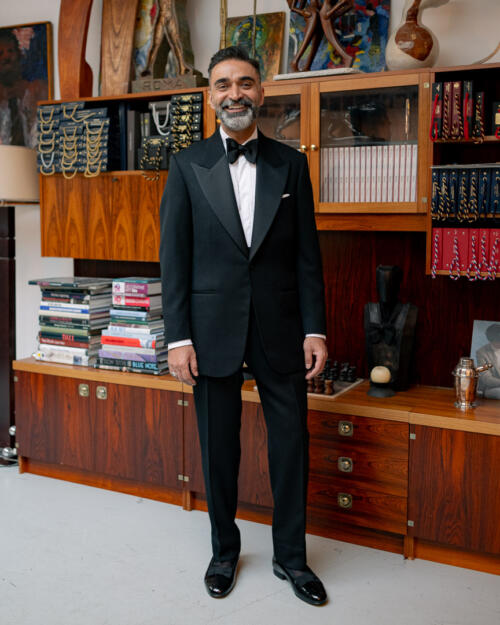
The suit was delivered five weeks after our fitting appointment, where any final alterations – which are done in London by Savile Row tailors – can be discussed. The photos in this article (shot at the La Bowtique studio in east London) were all taken before the local alterations (with one exception, which I’ll come to).
There’s not much to say about the front, because, as Mickael has already pointed out, I kind of knew what was coming. I liked the house style, the size 40 fitting jacket was a pretty solid fit off the rail, and I’d already seen the barathea made up in one of Mickael’s personal suits.
The front shot does underline how classic that house style is. At a length of 31.25”, the La Bowtique jacket is longer than any tailored jacket I’ve ever had by a minimum of three-quarters of an inch – my others range between 29.5” and 30.5”. But if there’s ever a time to try a longer, more traditional coat, I think it’s for evening wear.
I’m very pleased with the length, but, as before, I might go half an inch shorter on subsequent lounge suits. Of course, as with the gorge, you can opt to shorten the jacket at the fitting stage, but at what point do you start to lose the essence of the house-style? Too many adjustments and you might be better served trying another maker or going bespoke.
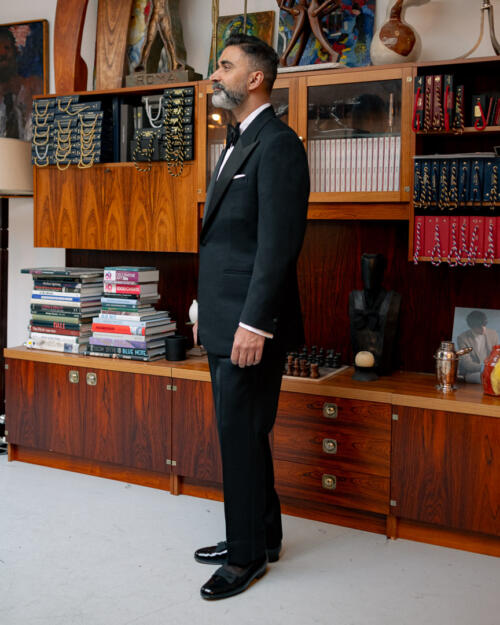
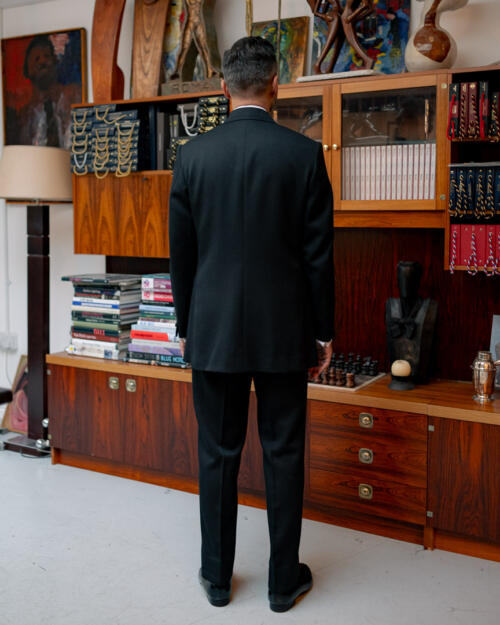
To maintain consistency with Simon’s reviews, Alex took a rear photo. It’s the first time I’ve ever looked quite so forensically at the back of one of my suits; it’s certainly instructive, but (as Simon is often at pains to point out) can be misleading too. A tilt of the camera, a shift in the light or a quick brush down can change the perception entirely; if you’re not careful one could end up chasing phantom fit issues in a game of whack-a-mole.
Nonetheless, Mickael and I spoke about three things. The first was the back of the knees where the trousers gave slightly, and he suggested we pick them up at the waistband.
The second was across the shoulders. Now, you should know that I’m a hugger, a wildly inept dancer, and I like to lean forward with shoulders rounded when in conversation with friends – as if engaged in a dangerous conspiracy.
I’ve learned the hard (and expensive way) that I need comfort, so the back of my jackets tend to have a bit of drape. We’d already picked the back up at the fitting stage, however, we both agreed it could be slightly cleaner, without restricting me, by taking it up a touch more.
Finally, the right sleeve looked a little rumpled. From side-on, the pitch seemed fine. We discussed removing a bit of excess from the sleeve – which is fairly full – but I decided against that for reasons of comfort.
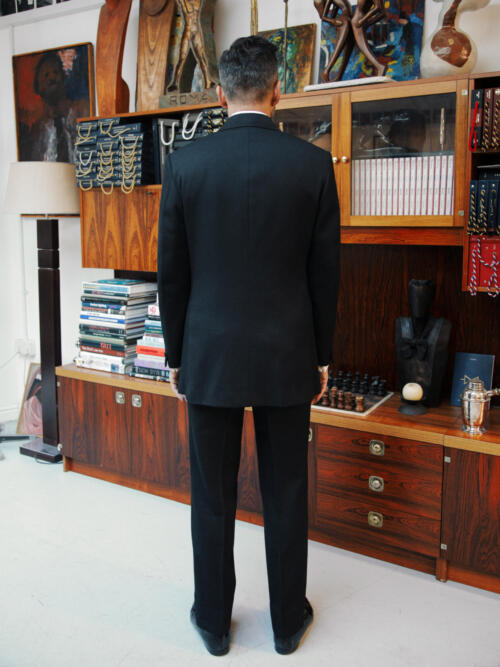
After the local alterations, the suit was pressed and ready for collection about a week later – the photo above shows the back of the finished suit.
I know pressing is something that most quality MTM/bespoke tailors will do, but few are quite as vocal about the benefits as Mickael. “It’s a totally different garment,” he tells me. Not only does it sharpen the lines of the suit, but it also brings shape and comfort when properly done. Case in point, the right sleeve has settled down nicely.
I could have just used this photo of the final suit and ignored the interim shot, but I hope the inclusion of both helps give the readers a better insight into the process, and illustrates that not everything necessarily needs ‘fixing’. I also appreciate Mickael’s openness to sharing images of the interim stages.
These minor alterations have helped turn a good fit into a very good one, and this will now be the starting point for subsequent commissions.

Having read Permanent Style (and the comments section) for many years, it’s clear to me there’s an increasing demand for quality MTM delivered at a reasonable price. Comparing like-for-like (i.e. this first make vs. other first makes), I’d rank La Bowtique among the better MTM tailors I’ve tried.
A two-piece suit or dinner suit starts from £2400 (mine was £2700), which is comparable to the price of most of the MTM tailors in Simon’s list (after allowing for a bit of post-Covid inflation).
Most of the brands on that list have less handwork than La Bowtique. Saman Amel’s Napoli line has similar levels (and I’d agree with Simon that theirs is another of the best MTM offerings going), but that’s around £1000 more expensive than La Bowtique (and some of the reasons for the price difference are explored here).
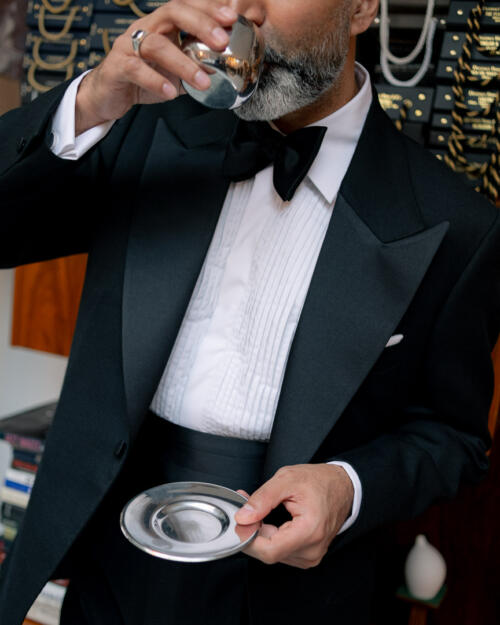
For the first-timer, it’s also incredibly convenient that La Bowtique sell every accessory you need for a black tie rig (bar shoes and jewellery): silk socks, cummerbund, braces, pocket square, MTM shirt and, of course, a bow tie – which is complimentary with every MTM dinner suit.
I’ll write about these in a follow-up article – some worked better than expected and some (notably the shirt) less well.
However, ultimately, the main reason I’d recommend La Bowtique’s MTM to readers is the same reason I went to them for my first bow tie: their affinity for evening wear. Mickael has worn virtually every type of evening garment you might ever consider for yourself; he knows the little details that can make or break black tie, and is familiar with the angels and the devil that lie therein. But, above all, he understands that these are clothes of celebration, joy and fun.
La Bowtique can be contacted on WhatsApp at +44 7572 869286
Manish is @the_daily_mirror on Instagram
Photos by Alex Natt
Publisher: Source link


